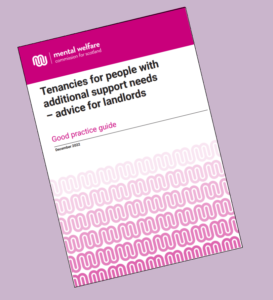New guidance on tenancies for people with additional support needs
The Mental Welfare Commission has published a new good practice guide for landlords about tenancy agreements for people with additional support needs. It will also be useful for social workers and families.
Advice for landlords and good practice guidance
Over the last decade, there has been a major shift in how and where people with additional support needs live and receive the care and support they need. Increasingly, people are supported to live as part of communities, enjoying the benefits and experiences community living brings.
Consequently, the Mental Welfare Commission have seen an increase in enquiries from housing associations, Local Authorities, private landlords and from social work services, about how these arrangements can be supported legally, and how those organisations can ensure that the person’s rights are upheld and promoted.
Suzanne McGuinness, executive director, social work, at the Mental Welfare Commission, said:
One area which can challenge landlords and social work services is how an individual who potentially lacks capacity to understand the contractual arrangements inherent in a tenancy agreement can be supported to sign the agreement.
Our new good practice guide addresses this issue. We hope it will be useful for all landlords, social work departments, advocacy and third sector organisations as they seek to support tenants.
It may also be of interest to relatives and carers of people with additional support needs who are tenants or prospective tenants.
Capacity to sign Tenancy Agreements
There are many challenges facing vulnerable people entering into tenancy agreements in Scotland. The guidance aims to provide some guidance for staff practising in this area and focuses on supported decision making.
The Mental Welfare Commission has identified a number of areas where people could be supported to access their own tenancies. These include:
- Making tenancy documents accessible and easier to read and understand – including having an Easy Read version
- Supported decision-making – to assist the person to understand the expectations on them as a tenant and what they can expect from their landlord
- Making use of Intervention Orders under the Adults with Incapacity Act
The guidance also includes advice on what to do if a person needs more support to sign a tenancy agreement, and highlights that any housing issues should be part of the care planning process.
You can read the full guidance here: https://www.mwcscot.org.uk/news/advice-landlords-tenancies-people-additional-support-needs
You can find a copy of the Easy Read Tenancy Guidance here: https://www.mwcscot.org.uk/sites/default/files/2022-12/easyread_tenancyguidance.pdf

